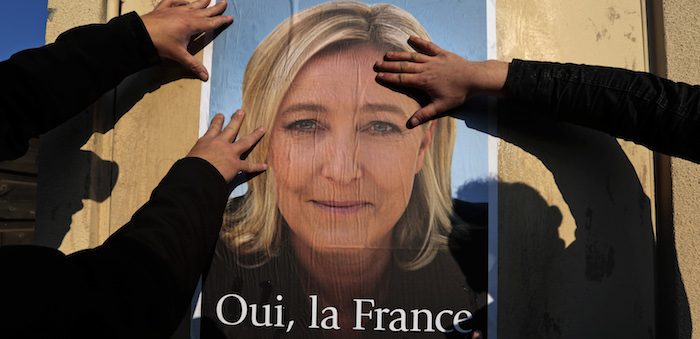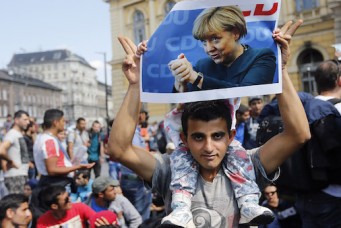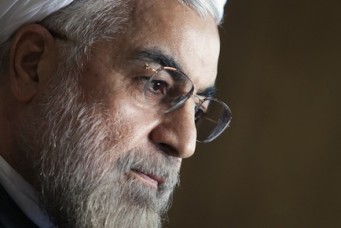Marine Le Pen’s Challenge
Young, modern, and media friendly, the daughter of National Front founder Jean-Marie Le Pen has recast the extreme right party as a less xenophobic, more palatable, movement. But if the National Front fails to shed its racist ideology, it is unlikely to build on its electoral successes.

Campaign poster for National Front leader Marine Le Pen, Frejus, March 18, 2014. Eric Gaillard/Reuters
All over Europe, radical right populist parties are on the rise. In the French regional elections of December 6–13 last year, the National Front party, known in French as the Front National (FN), scored a historic high of 27.8 percent of the votes in the first round and the support of 6.8 million voters in the second. The day after the final vote, National Front Vice President Florian Philippot bragged: “We are the first party of France, there’s no longer any doubt about it.”
The electoral progression of the National Front is undeniable, yet it is worth remembering that in the December ballot it did not win a single region. It was not victorious in Nord-Pas de Calais-Picardie, where National Front President Marine Le Pen herself headed the electoral list, nor in Provence-Alpes-Côte d’Azur, where her niece, Marion Maréchal-Le Pen, was running—even though the National Front lists in both these regions exceeded 40 percent of the votes in the first round, and surpassed by far the union lists of the left and of the right. Given this paradox, Philippot’s optimism deserves to be qualified: the National Front is not yet France’s top party. In spite of the progress made under Marine Le Pen, notably the strategy to de-demonize the party and attract more centrist supporters, many obstacles remain in the way of the National Front’s ultimate goal of winning the French presidency.
The National Front was co-founded in 1972 by Marine’s father, Jean-Marie Le Pen, and the neo-fascist movement Ordre Nouveau (New Order). Their aim was to federate the components of the French extreme right, discredited by the collaboration of many of its members with the Nazi occupation of France and the Vichy regime from 1940 to 1944. The National Front made a political breakthrough a decade later, in reaction to the so-called “socialo-communist” victory of 1981 led by Socialist leader François Mitterrand. Municipal by-elections in the town of Dreux in 1983 brought the moderate right to form an alliance with the National Front to defeat the Socialist mayor, a development that granted political legitimacy to the extreme right. Then in the European elections of 1984, the National Front won nearly 11 percent of the votes and ten seats, with an anti-immigrant nationalist platform defending a “Europe of homelands” and “national preference” policies reserving jobs, social benefits, and public housing to French citizens over foreigners. In the following years, Le Pen’s party would win some 15 percent of French votes whatever the election. In the first round of the 2002 presidential election, Jean-Marie Le Pen not only won a record 16.9 percent of the vote for an extreme right presidential candidate, but he qualified to stand in the second-round runoff, coming in ahead of the Socialist Party candidate, the then-Prime Minister Lionel Jospin.
However, Le Pen’s surprise performance could not mask the fact that the National Front had fallen into deep crisis, partly over how Le Pen’s extremist rhetoric and anti-system positions made the party a political pariah. In 1998, deputy leader Bruno Mégret broke away and formed a rival party, the Mouvement National Républicain, taking half the National Front’s party officials and elected representatives with him. Le Pen, nearly 80 by then, drew hardly 10 percent of the votes in the 2007 presidential election—his fifth and last attempt at winning the Élysée Palace—and his party captured a little over 4 percent in the legislative elections that followed. Meanwhile, more respectable-looking radical right leaders in Europe had begun to steal the spotlight from Le Pen, such as Nigel Farage of Britain’s UK Independence Party, Geert Wilders of the Party for Freedom in Holland, or Timo Soini of the True Finns (now called the Finns Party) in Finland.
The rebirth of the National Front started when Marine Le Pen won the leadership election and succeeded her father as party leader in January 2011. She sought to rebuild the National Front, expand its shrinking electoral support, and above all “de-demonize” it—that is, get rid of the labels of racism, anti-Semitism, and extremism that had long been associated with the party. Marine Le Pen’s strategy became a point of contention with her father, who considered that “a ‘nice’ FN will interest nobody.” A decisive break with Jean-Marie Le Pen’s approach came after his April 2015 interview for the extreme right journal Rivarol, in which he defended Vichy Marshal Philippe Pétain and his followers and called the Nazi gas chambers “a minor detail of the history of World War II.” After a long legal battle, the National Front expelled Jean-Marie Le Pen from the party he had founded and which his youngest daughter now headed, and a page of French political history turned.
Rise of the Right
Since Marine Le Pen took over, the National Front’s electoral comeback has been nothing less than spectacular. Its support climbed to 18 percent in the first round of presidential balloting in 2012; to 25 percent in the 2014 European elections and in the 2015 departmental elections; and almost 28 percent in the first round of regional elections in December 2015. Since the last European elections, the National Front has been overtaking Nicolas Sarkozy’s Republicans party and the ruling Socialist Party in the number of ballots. And the “new” political style of Marine Le Pen is appealing to citizens that her father repelled. Among Roman Catholics, the gospel was a rampart against a vote for the extreme right. Yet in the first round of the 2015 regional elections, nearly one-third of Catholics as a bloc, and a quarter of all regular churchgoers, usually more obedient to the precepts of the Christian faith, voted for the National Front. Among voters of Jewish faith, aware of Jean-Marie Le Pen’s anti-Semitism, only 6 percent cast ballots for the National Front in the 2002 presidential election; by contrast, Marine Le Pen’s candidacy for president drew 13.5 percent of Jewish voters in 2012. According to recent surveys, support for the National Front has also been rising among gay voters. Even in the public sector, a traditional stronghold of the French Left, the National Front is making headway, especially at the lower levels of the civil service hierarchy. Among members of leftwing unions such as the General Confederation of Labor, the National Front drew one-third of the votes in the 2015 regional elections.
Women have been traditionally more reluctant to support the National Front, and other far right parties throughout Europe; that has been a serious challenge, given that women represent more than half of the electorate. In the 2012 presidential election Marine Le Pen overcame this gender gap. Presenting herself as a working woman, young, modern, and quasi-feminist, she won almost as many votes among female and male voters (17.5 versus 19 percent).
Marine Le Pen’s goal was to show that her party had shed its racist, xenophobic, and extremist overtones and was open to all. The reality is more complex. She has repeatedly and strongly condemned anti-Semitism. But she voices the same anti-immigrant positions that were a trademark of her father, and advocates Jean-Marie’s same “national preference” policies. She has gone even further than her father in condemning the Islamization of French society, comparing the street prayers of Muslims to an “occupation”—meaning the German occupation. Her voters reject foreigners, immigrants, minorities, and especially Muslims, as intensely as her father’s did. In the 2015 regional elections, only 36 percent of the National Front voters entirely agreed that “French Muslims are as French as everyone else” (versus, respectively, 53 and 73 percent among moderate right and leftwing voters). Ninety-one percent of National Front voters thought there were “too many immigrants in France” (compared with 60 percent of the moderate right voters and 22 percent of the leftwing voters). This fear in turn colored their perceptions of the European Union, seen by 90 percent of National Front voters as an open door for immigration (versus 58 percent of the moderate right voters and a quarter of the leftwing voters). Anti-immigrant feelings are a necessary condition for such voter support, as they were at the time of her father. This explains why the level of education remains the best predictor of National Front votes and why the party gets less support from the middle and upper-middle classes. Education teaches one to think rationally, to accept complexity, to fight prejudice. And it conditions employment and social status. In the 2015 regional elections, the National Front’s results were three times higher among voters who did not pass the baccalaureate, the doorway to higher education, than among those who went on to university. And it drew more than half of the votes of the manual blue collar workers, compared to 20 percent among higher-level executives and professionals.
The resistance of the old patterns is even more obvious if one looks at the party members and followers. In the 2015 departmental elections, more than a hundred National Front candidates were prosecuted for their blatantly racist, homophobic, anti-Semitic comments. Surveys among declared sympathizers of the party, before and after Marine Le Pen took the lead, show that they are the most inclined to reject people of another race, religion, or culture. They score higher on anti-Semitism and ethnocentrism scales than do the supporters of other parties. National Front supporters embrace the most extreme forms of racism, such as the belief in a hierarchy within the human race. The data suggests that despite Marine Le Pen’s impressive results, there are limits to what her de-demonization efforts can achieve.
An Anti-System Party
Despite its electoral successes, the National Front lacks some basic internal and external political resources. Since 2011, it has expanded and renewed its membership, attracting women and youth. In July 2015, the number of party members paying their dues on time had risen to 51,551—that’s ten thousand more members than in 1998, before the split in the party. Yet this is still far less than the Socialist Party (roughly 170,000) or the Republicans (200,000). And the political infrastructure required to rule is missing. In terms of elected officeholders, the party’s representation remains marginal, at the municipal level (controlling eleven municipalities out of more than 36,000), as well as at the departmental level (sixty-two counselors out of 4,108, in fourteen departments out of one hundred) and the parliamentary level (two deputies out of 577, two senators out of 348). If in the last regional elections the National Front tripled its number of regional counselors (from 118 to 358), it still does not govern a single region. The deficit in party staff is striking, notwithstanding the National Front’s efforts to recruit among civil servants, business owners, and academics by creating thematic networks with catchy names (“Racine” for teachers, “Marianne” for students, “Audace” (audacity) for young activists, “Clic” in the cultural sector, etc.). Even within the National Front, some party officials privately question its ability to act at a national level, believing that Marine Le Pen, regardless of what she says, is not ready to govern.
Likewise, public opinion still does not see the National Front as able to govern France. In the 2016 annual TNS Sofres Barometer on the National Front’s image, 54 percent of the respondents saw it as “a party who can only gather together protest votes” versus 36 percent who saw it as “a party with the ability to participate in government”; only 22 percent agreed that Marine Le Pen would make “a good president of the Republic.” If the National Front’s image is less frightening since Marine Le Pen took the party’s helm, a majority of French people still considers it extreme right, racist, and “a danger for democracy” (56 percent).
The National Front remains fundamentally an “anti-system” party, in the sense given to the term by the Italian sociologist Giovanni Sartori. It is at odds with the basic values of the French Republic, due to its doctrine of “national preference” and its de-legitimization of the other parties. This posture keeps it in political isolation, all the more in a country like France with its two-round majority voting system. While the National Front gains an increasing number of votes in the first rounds of elections, in the second rounds it is regularly defeated because it cannot win alone, and cannot form alliances. The 2015 regional elections offer a good example. In Nord-Pas de Calais-Picardie and Provence-Alpes-Côte d’Azur, the National Front came ahead in the first round with more than 40 percent of the votes; the candidates of the Union de la droite (Union of the Right) came next with around a quarter of the votes. The Socialist Party opted to withdraw from the second round, allowing Union of the Right candidates Xavier Bertrand and Christian Estrosi to win, rather than take the chance to let the National Front win. More than 75 percent of Socialist voters switched to supporting the two conservative candidates.
Within the party itself, the possibility of a strategic shift divides opinions. Marion Maréchal-Le Pen stands for a platform that is economically more liberal, socially more conservative than Marine Le Pen. And she favors an alliance encompassing all the components of the right, while Marine Le Pen favors a “neither left nor right” approach.
The presidential election is the keystone within the French system, mobilizing the most voters. Less than a year away, the context at first sight seems promising for Marine Le Pen. The unemployment rate lingers around 10 percent, and is more than double among young people entering the labor market. This generates resentment and fear of the future. A series of unprecedented terror attacks in 2015 and 2016—killing more than 230 people at Charlie Hebdo, the Hyper Cacher, the Bataclan, the Stade de France, the seafront in Nice, and the church of Saint-Étienne-du-Rouvray—feed the fear of jihad, and suspicions of French Muslims as a whole. The widening flow of migrants and refugees from the Middle East and Africa favors nationalistic drifts and reflexes of closure. The success of the Brexit campaign in Britain to quit the European Union comforts the eurosceptics. And disaffection towards the political class has reached historical heights, with 89 percent of the electorate sharing the feeling that the political class “does not care about what people like us think.” Over two-thirds believe that democracy does not function well, and trust neither the left nor the right to govern the country.
According to a TNS Sofres survey in June 2016, Marine Le Pen should easily top her 2012 showing by some ten percentage points, and she can expect to make it to the second round in the 2017 election. She comes out ahead in the first round under all scenarios save one: if the conservative ex-Prime Minister Alain Juppé runs as a candidate; in such a case, he would garner around 35 percent of the vote and Marine Le Pen 29 percent. But she would be widely beaten in the second round, when matched up against any potential candidate.
Such early polls should be taken with a grain of salt. Yet they are revealing about the National Front’s evolution. France’s radical right party is at a turning point, its political mutation unfinished. For the old guard of the party, starting with its founding father, Jean-Marie Le Pen, the de-demonization strategy has gone too far, the party has betrayed its ideals. For the mainstream parties and their voters, it has not gone far enough to rid itself of racism, anti-Semitism, and extremism. Marine Le Pen hence faces a strategic dilemma. Going further—changing the name of the party, openly repudiating its doctrine of “national preference”—could eventually lead to a new split in the party, as well as make it less attractive for the voters seduced by its anti-system attitude. Yet, without such moves, the National Front will find itself unable to build on its successes and come to power.
Translated from the French by Amir-Hussein Radjy.
Sylvain Crépon is a lecturer in political science at Université François-Rabelais de Tours, affiliated with the Laboratoire d’Etude et de Recherche sur l’Action Publique. He is the author of Enquête au coeur du nouveau Front national, and co-editor of Les faux-semblants du Front national: Sociologie d’un parti politique.
Alexandre Dézé is a lecturer in political science at the Université de Montpellier, affiliated with the Centre d’études politiques de l’Europe Latine. He is the author of Le Front national: à la conquête du pouvoir?; and co-editor of Les faux-semblants du Front national: Sociologie d’un parti politique.
Nonna Mayer is emerita director of research at the Centre National de la Recherche Scientifique. She is a political scientist affiliated with the Center for European Studies at Sciences Po. She is the author of Ces français qui votent Le Pen. She is co-editor of Les faux-semblants du Front national: Sociologie d’un parti politique; Le Front national à la découvert; and Extreme Right Activists in Europe: Through the Magnifying Glass.




